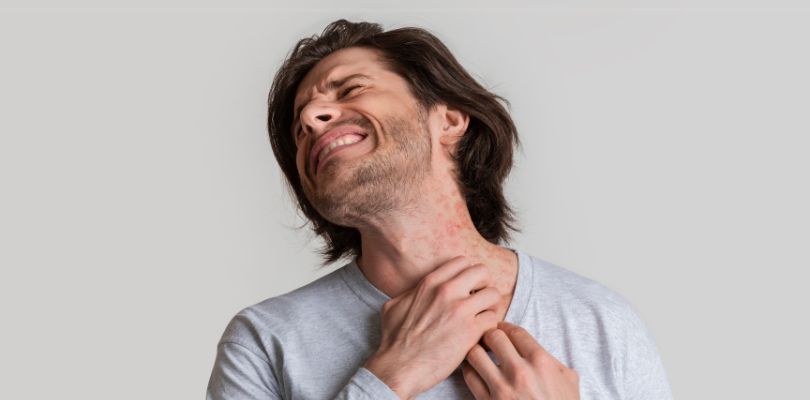What is Eczema?
Eczema is a chronic skin condition characterized by inflamed, itchy and/or red skin. It can occur anywhere on the body but is commonly found on the hands, face, neck and legs. Eczema is believed to be caused by a combination of genetic and environmental factors that lead to a dysfunctional skin barrier and an overactive immune response. More than 31 million Americans have some form of eczema, per the National Eczema Association.
Common Signs and Symptoms of Eczema
Symptoms of eczema can appear anywhere on the body and vary widely from person to person. They may include:
- Itching: Often intense, itching is one of the primary symptoms of eczema.
- Redness: Affected areas of the skin may become red or inflamed.
- Dry skin: The skin often feels dry, rough, and scaly.
- Rash: Eczema commonly causes a rash, which may be bumpy or flat.
- Cracked skin: In severe cases, the skin can become cracked and even bleed.
- Thickened skin: Repeated scratching can cause the skin to thicken in affected areas.
- Swelling: Inflammation can lead to swelling of the skin.
- Oozing or weeping: Blisters may form and ooze fluid, especially during flare-ups.
- Crusting: Dried fluid from blisters can form a crust on the skin.
- Blisters: Small, fluid-filled blisters can develop on the skin.
- Skin discoloration: Affected areas may become lighter or darker than the surrounding skin.
- Rough patches: The skin may develop rough, raised patches that are different from the surrounding skin.
- Scaly skin: The skin may appear scaly, especially on the hands and feet.
- Sensitive skin: The skin can become more sensitive to irritants and allergens.
- Burning sensation: Some people experience a burning or stinging sensation in the affected areas.
- Pain: Eczema can sometimes cause painful cracks or fissures in the skin.
- Heat: Inflamed skin may feel warm to the touch.
- Hives: Raised, red bumps that may itch or burn can appear alongside other eczema symptoms.
- Sleep disturbance: Severe itching and discomfort can interfere with sleep.
- Peeling skin: The outer layer of skin may peel away in sheets or flakes.
If you notice any of these symptoms, it is strongly recommended that you speak to your doctor as soon as possible so you can begin treating it.
When it comes to ADHD medication and pregnancy it comes down to weighing the risks and benefits. We go over them here to help you decide.
Triggers for Eczema
What exactly is it that triggers eczema? Studies show that there are many different factors that can trigger eczema to flare up and worsen symptoms. Common triggers include:
Irritants
Harsh soaps, shampoos, dishwashing liquids and laundry detergents have been known to trigger and exacerbate eczema. These products can have strong fragrances that can strip the skin of natural oils, leading to irritation. This can be mitigated by using soaps and detergents with more gentle ingredients, tailored for sensitive skin.
Environmental Factors or Allergens
Dust mites, pollen (such as grasses and weeds), pet dander (proteins found in the skin flakes, saliva and urine of pets) and mold can all lead to eczema flare ups. Even cold and dry weather and dampness can worsen eczema.
Food Allergies
Any sort of food allergy or sensitivity can result in a flare up of eczema. However, some more common ones include dairy, eggs, peanuts, soya and wheat.
Certain Materials
Certain harsh materials worn on the skin, such as wool and synthetic fabrics, can rub and disrupt your skin, leading to an exacerbation of eczema. If this tends to be a common trigger for you, you can try to find materials that better accommodate sensitive skin, such as silk or cotton.
Hormonal Changes
Some women may find their symptoms get worse in the days before their period or during pregnancy. Our emotional state can also lead to an eczema flare up, such as excess stress.
Treatment Options
Eczema can be managed through a combination of treatments aimed at reducing symptoms, preventing flare-ups and improving skin health. Here are some common treatment options:
Topical Corticosteroids
These are anti-inflammatory medications applied directly to the skin to reduce redness, swelling and itching. They are available in different strengths. Your doctor will prescribe the appropriate one based on the severity of your eczema.
Moisturizers
Moisturizers help restore the skin barrier by locking in moisture and preventing dryness. They should be applied regularly, even when eczema is not flaring, to keep the skin hydrated. They can be found in the form of ointments, creams and lotions specifically formulated for sensitive skin.
Oral Medications
Antihistamines can help reduce itching and are available over-the-counter or by prescription.
Biologic Therapies
Biologics are targeted therapies that affect specific parts of the immune system. They are used for moderate to severe eczema that doesn’t respond to other treatments.
Phototherapy (Light Therapy)
Phototherapy is a treatment that involves exposing the skin to controlled amounts of natural sunlight or artificial ultraviolet (UV) light to reduce inflammation and itching.
Wet Wrap Therapy
This involves applying a moisturizer or topical medication to the affected areas, followed by wrapping the skin with wet bandages. The wet wraps help the skin absorb the medication and retain moisture.
Behavioral and Lifestyle Changes
Identifying and avoiding specific triggers such as certain fabrics, soaps, or foods can help reduce flare-ups. This also includes stress management, since stress can exacerbate eczema. Techniques like meditation, yoga or counseling can be beneficial.
Dietary Management
If food allergies are a trigger, eliminating specific foods from the diet can help manage eczema. This should be done under medical supervision. Some people find relief from taking omega-3 fatty acids, probiotics or vitamin D.







